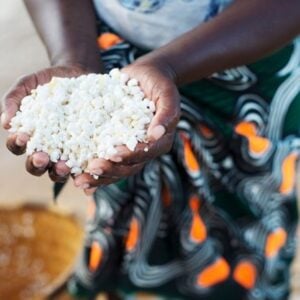Smallholder farmers across Ethiopia are learning sustainable farming practices such as vermicomposting and integrated pest management to restore soil health and improve their agricultural productivity. These techniques have already resulted in higher maize yields, enhancing household food security, strengthening family incomes, and supporting broader community resilience. Through the Ethiopia Food Systems Resilience Program (FSRP), more than 1.2 million farmers have so far been reached with a range of interventions designed to build climate resilience and ensure long-term food security.
For farmers like 56-year-old Yohanis Tesfaye from Oromia, these efforts have been life-changing. Years of unsustainable farming practices, coupled with erosion, heavy rainfall, and continuous chemical fertilizer use, had left his land infertile and unproductive. As maize yields declined, his family faced food shortages and economic hardship. His situation reflects a wider national challenge, as soil degradation threatens Ethiopia’s agriculture sector, which sustains over 85 percent of the population. More than seven million hectares of land have already turned acidic, reducing their suitability for crops and pushing many farming households deeper into poverty.
Tesfaye’s fortunes shifted after he attended FSRP-led training sessions organized by his district agricultural office. There, he was introduced to integrated soil fertility management techniques, including vermicomposting. With support from the program, he built a composting unit and began applying organic compost along with small amounts of inorganic fertilizer to his maize field. Within a single season, his maize yield increased by 67 percent—from 9 to 15 quintals—improving his family’s food supply and generating additional income.
The FSRP, supported by the World Bank and the Ethiopian government, has so far reached nearly 50,000 farmers directly with training on organic fertilizers, pest management, and soil restoration practices such as lime application. These hands-on demonstrations have helped farmers improve soil structure, correct acidity, and boost crop health. Beyond soil fertility, the program also strengthens farmer groups, builds agribusiness capacity, expands access to irrigation and inputs, and supports enterprise development. In total, over 1.2 million people have benefited from the program’s broader interventions.
Ethiopia’s participation in the wider regional Food Systems Resilience Program, spanning seven countries in Eastern and Southern Africa, has further enhanced its agricultural capacity. This cross-country initiative fosters knowledge-sharing on best practices in climate-smart agriculture, digital tools, market access, and policy reforms. In Ethiopia, the program is upgrading agricultural extension services, building digital agriculture platforms, and creating knowledge hubs to provide farmers with practical, hands-on training.
Tesfaye’s success illustrates the program’s impact at the grassroots level. By adopting sustainable farming practices, he has restored productivity on his farm, improved his household’s resilience, and is now encouraging neighboring farmers to follow suit. His story demonstrates how targeted investments in soil health and farmer training can transform livelihoods, strengthen food security, and pave the way for more sustainable and climate-resilient agriculture in Ethiopia.






